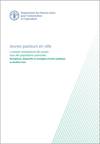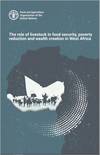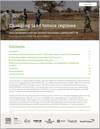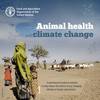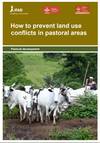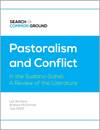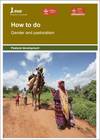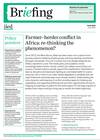Le faible taux de scolarisation et de formation professionnelle des éleveurs pastoraux s'ajoute à leur marginalisation et justifie une approche spécifique de l’intégration de la jeunesse pastorale. L’étude dont ce rapport est issu a analysé le contexte institutionnel des jeunes migrants issus de milieux pastoraux et leurs perceptions publiques au Burkina Faso (Février 2019 à Ouagadougou, Mars 2019 à Bobo Dioulasso et Dori). Le rapport traite trois questions principales: la perception publique des migrations vers les villes et des jeunes issus de milieux pastoraux ; les services existants ciblant ces jeunes (formation professionnelle, scolarisation, soutien à l’inclusion sociale et/ou économique) ; les actions potentielles d’inclusion économique et sociale des jeunes migrants d’origine pastorale.
Year of publication: 2020Organization: Organisation des Nations Unies pour l'alimentation et l'agriculture (FAO), Institut de recherches et d'application de méthodes de développement (IRAM)
Topic: Jeunesse et égalité des sexes
Language: Français
Type of document: Technique
Geographical coverage: Afrique occidentale
With the objective of gaining a better insight into the challenges and opportunities of the livestock sub-sector in West Africa, FAO has conducted several studies and held various workshops in recent years. The outcomes of these studies and workshops conducted between 2009 and 2014 were published and distributed as hard copy reports and disseminated as on-line publications. These reports included topics such as value chains, cross-border transhumance, animal feed resources, priority animal diseases, among others, were informative in their own right. Still, the fact that they targeted specific areas of livestock in a fragmented manner did not address the need of readers whose wish was to have a comprehensive understanding of the livestock sector in West Africa. It is in response to this demand for a comprehensive outlook of the West African Livestock sub-sector that different reports and studies have been compiled into this one book. The book has twelve chapters, covering almost all aspects of livestock in the region. Attempts were made to enrich the information provided by including eight short case studies focusing on different aspects of the livestock sub-sector in West Africa. The book attempts to fill the gap of a need for comprehensive information on the potential, performance, challenges, and prospects of the livestock sub-sector in West Africa.
Year of publication: 2020Organization: Organisation des Nations Unies pour l'alimentation et l'agriculture (FAO)
Topic: Sécurité alimentaire, Résilience, Services sociaux
Language: English
Type of document: Technique
Geographical coverage: Afrique occidentale
This brief reviews farming and pastoralist livelihood systems to highlight their evolving and overlapping tenure regimes. It also discusses the increasing pressure on resources that has contributed to strained relationships and in some cases polarization and conflict. Unless this context is well understood, the problems and challenges cannot be effectively addressed. Finally, the brief considers steps needed to take full advantage of available opportunities for building the resilience of these livelihood systems.
Year of publication: 2020Organization: Auteurs individuels,
Topic: Régime foncier
Language: English
Type of document: Technique
Geographical coverage: Afrique orientale
Livestock support more than 750 million of the world’s poorest people. This brochure makes the case that improving animal health should be an integral part of strategies aimed at food security and sustainable development in the context of climate change. Firstly, to reduce impacts of climate change on animal health and the spread of pathogens – as the majority of emerging diseases have an animal origin. Secondly, to mitigate effects of climate change – as healthier animals are more productive and generate lower emissions per weight of product. Thirdly, to adapt to climate changes – as animals are more resilient than crops to adapt to marginal conditions and withstand climate shocks. To address these challenges, opportunities for action are presented – including developing capacity to tackle animal disease events triggered by climate change, promoting One Health approaches, and investing in public and private collaboration and research. Ongoing FAO activities in these areas are presented including tools, platforms and strategies to track, forecast and support control of disease outbreaks. FAO issues a call to action for strengthened engagement, investment and collaboration at the interface of animal health and climate change in order to improve food security while protecting the planet.
Year of publication: 2020Organization: Organisation des Nations Unies pour l'alimentation et l'agriculture (FAO)
Topic: Changement climatique
Language: English
Type of document: Bulletins
Geographical coverage: Global
This How-to-do Note focuses on how conflicts over land and natural resources in pastoral areas can be prevented or, if already present, transformed into positive outcomes. It identifies why land tenure is a complex issue within pastoralism, discusses the combination of factors that are contributing to more insecure pastoral tenure and triggering pastoral area conflicts, and introduces some of the frameworks, tools and approaches that can be used as part of project design to reduce the potential for conflict.
Year of publication: 2020Organization: Fonds international de développement agricole (FIDA)
Topic: Conflit, Régime foncier
Language: English
Type of document: Technique
Geographical coverage: Global
From Mali to South Sudan, governments, regional bodies, peacebuilders, development agencies, environmentalists, economists, and security forces are actively attempting to address the sources of violence and instability that affect both pastoral communities and the rural societies with whom they share resources and landscapes. These interventions are often shaped by differing assumptions about the source and nature of these conflicts, despite the availability of extensive research and analysis. Though the local dynamics of conflict vary across different contexts, a number of trends and debates appear throughout the literature on pastoralism and conflict. This review draws on several hundred sources to synthesize the major points of consensus and divergence in the existing literature and identify relevant research gaps. This analysis presents data from across Sudano-Sahelian West and Central Africa, to link comparable findings that are often presented in isolation.
Year of publication: 2020Organization: Auteurs individuels
Topic: Conflit, Résilience
Language: English
Type of document: Technique
Geographical coverage: Afrique occidentale, Afrique centrale
This HTDN complements the IFAD Toolkit and HTDN on Pastoralism produced in 2018, which highlights the importance of gender in pastoral production systems. This How To Do Note (HTDN) on Gender and Pastoralism builds on this introduction highlighting important issues and tools to use to address them. This HTDN is designed for country programme teams, consultants and technical advisors, with the objective of providing guidance on the designing of projects with gender-sensitive interventions targeted at empowering pastoralist women so as to achieve more equitable development. This HTDN is divided into two main sections. Section One identifies the issues that particularly impact pastoralist women and related gender issues and highlights the need for greater women’s empowerment. It introduces the relevant IFAD policies and publications that have helped broaden understanding of gender issues within pastoralism and brings in lessons learned from other agencies. Section Two provides practical guidance that project developers and others can use for more gender-sensitive interventions with pastoralists. Reference materials, as well as gender-focused tools and checklists that can help in project development, are also provided.
Year of publication: 2020Organization: Fonds international de développement agricole (FIDA)
Topic: Jeunesse et égalité des sexes
Language: English
Type of document: Technique
Geographical coverage: Global
Le pastoralisme est jugé comme perturbateur et rétrograde, livrant une bataille perdue d’avance la conquête de ressources trop rares. Pourtant, en vérité, c’est une méthode sous-estimée d’adaptation à la variabilité qui peut rendre les moyens d’existence et les paysages plus résilients face au climat. Il est essentiel de comprendre les racines, la dynamique et la signification du conflit, de prévoir un espace pour comprendre et négocier, et de soutenir les moyens d’existence et les débouchés économiques afin de dégager des trajectoires vers la paix pour l’ensemble de la région.
Year of publication: 2020Organization: Institut international pour l'environnement et le développement (IIED)
Topic: Conflit
Language: Français
Type of document: Politiques et législation
Geographical coverage: Afrique occidentale


